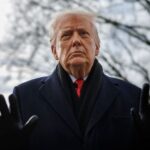
The Supreme Court held Friday that the Department of Justice interpreted an obstruction statute too broadly when using it to charge hundreds of defendants for their behavior in the Jan. 6 Capitol incursion.
The court sided 6-3 in Fischer v. United States with a defendant who challenged the statute, Section 1512(c)(2), which holds up to 20 years in prison for anyone who “obstructs, influences, or impedes any official proceeding.”
“To prove a violation of Section 1512(c)(2), the Government must establish that the defendant impaired the availability or integrity for use in an official proceeding of records, documents, objects, or as we earlier explained, other things used in the proceeding, or attempted to do so,” Chief Justice John Roberts wrote in the majority ruling.
He added: “The judgment of the D. C. Circuit is therefore vacated, and the case is remanded for further proceedings consistent with this opinion.”
Of the 1,424 defendants charged following Jan. 6, over 350 were charged with “corruptly obstructing, influencing, or impeding an official proceeding,” according to May numbers from the DOJ.
Multiple defendants charged under the statute were granted early release in light of the justice’s decision to hear the case.
The ruling also has implications for special counsel Jack Smith’s election interference case against former President Donald Trump.
Two of the charges in the indictment, which alleges Trump employed “knowingly false claims of election fraud to obstruct the federal government function by which those results are collected, counted, and certified,” are related to the statute.
The Supreme Court will also soon rule on Trump’s bid to dismiss the case based on presidential immunity.
Do you agree with these Supreme Court decisions?
Yes: 0% (0 Votes)
No: 0% (0 Votes)
Joseph Fischer, who was charged under Section 1512(c)(2), argued the DOJ’s use of the statute to prosecute Jan. 6 defendants for obstructing Congress’ certification of the 2020 election was an “unprecedented expansion.”
Fischer noted it was enacted as part of the Corporate Fraud and Accountability Act of 2002 to target crimes of evidence tampering, focusing on “deterring fraud and abuse by corporate executives.”
All content created by the Daily Caller News Foundation, an independent and nonpartisan newswire service, is available without charge to any legitimate news publisher that can provide a large audience. All republished articles must include our logo, our reporter’s byline and their DCNF affiliation. For any questions about our guidelines or partnering with us, please contact [email protected].







